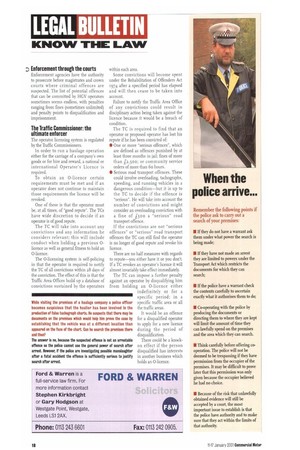LEGAL BULLETIN
Page 20

If you've noticed an error in this article please click here to report it so we can fix it.
KNOW THE 1-ILW
Enforcement through the courts
Enforcement agencies have the authority to prosecute before magistrates and crown courts where criminal offences are suspected. The list of potential offences that can be committed by HGV operators sometimes seems endless, with penalties ranging from fines (sometimes unlimited) and penalty points to disqualification and imprisonment.
The Traffic Commissioner: the ultimate enforcer
The operator licensing system is regulated by the Traffic Commissioners.
In order to run a haulage operation either for the carriage of a company's own goods or for hire and reward, a national or international Operator's Licence is required.
To obtain an 0-licence certain requirements must be met and if an operator does not continue to maintain those requirements the licence will be revoked.
One of these is that the operator must be, at all times, of "good repute". The TCs have wide discretion to decide if an operator is of good repute.
The TC will take into account any convictions and any information he considers relevant; this will include conduct when holding a previous 0licence as well as general fitness to hold an 0-licence.
The 0-licensing system is self-policing in that the operator is required to notify the TC of all convictions within 28 days of the conviction. The effect of this is that the Traffic Area Offices build up a database of convictions sustained by the operators within each area.
Some convictions will become spent under the Rehabilitation of Offenders Act 1974 after a specified period has elapsed and will then cease to be taken into account.
Failure to notify the Traffic Area Office of any convictions could result in disciplinary action being taken against the licence because it would be a breach of condition.
The TC is required to find that an operator or proposed operator has lost his repute if he has been convicted of:
• One or more -serious offences", which are defined as offences punished by at least three months in jail; fines of more than £2,500; or community service orders of more than 6o hours.
• Serious road transport offences. These could involve overloading, tachographs, speeding, and running vehicles in a • dangerous condition—but it is up to the TC to decide if the offence is "serious". He will take into account the number of convictions and might consider an overloading conviction with a fine of isoo a "serious" road transport offence.
If the convictions are not "serious offences" or "serious" road transport offences the TC can still find the operator is no longer of good repute and revoke his licence.
There are no half measures with regards to repute—you either have it or you don't. If a TC revokes an operator's licence it will almost invariably take effect immediately. The TC can impose a further penalty against an operator by disqualifying him from holding an 0-licence either indefinitely or for a specific period; in a specific traffic area or all the traffic areas.
It would be an offence for a disqualified operator to apply for a new licence during the period of disqualification.
There could be a knockon effect if the person disqualified has interests in another business which holds an 0-licence.
































































































